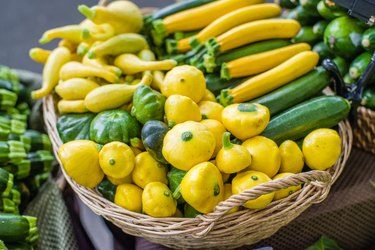
Yellow squash, also called yellow zucchini or summer squash, is a hot-weather vegetable picked in its immature stage to ensure a thin, edible skin and sweet, soft flesh. This squash typically ranges in size from 6 to 8 inches long, although it can be smaller, depending on when you pick the fruit says the University of Illinois Extension.
The nutrition in summer squash helps make it a healthy, versatile addition to your meals. You can eat yellow squash raw, as well as stir-fried, baked, grilled or sauteed. You can also substitute it for any green summer squash since the taste is similar.
Video of the Day
Video of the Day
Low Calories and Fat
One cup of raw, sliced yellow squash contains 18 calories. This low-calorie vegetable is an ideal side dish if you wish to lose weight. Yellow squash essentially has no fat — a 1-cup portion provides only 0.2 grams (g), according to the USDA National Nutrient Database. Limit fat consumption to no more than 20 to 35 percent of total daily calories to avoid gaining unwanted weight. Too much fat in your diet may also raise your risk of a heart attack or stroke, says the Heart and Stroke Foundation.
Keeping your calories low but building a balanced meal does not have to be mutually exclusive. You can serve a portion of yellow squash with a lean meat or fish and a healthy grain, such as wild rice, quinoa or couscous.
Carbohydrates for Energy
The carbs in yellow squash amount to 3.8 g per 1-cup serving, which provides you with 2.9 percent of the 130 g daily recommendation, according to Dietary Reference Intakes. Carbs serve as the main supply of energy for your body.
Yellow squash also helps you consume the fiber you need each day; 1 cup contains 1.2 g. Fiber can play a critical role in helping you lose weight. High-fiber foods satisfy hunger better than low-fiber foods by providing more bulk in your diet. Fiber also helps regulate bowel movements and decreases your chances of developing diverticulitus, a condition that affects your colon.
The National Academies recommends including 25 to 38 g of fiber in your diet every day.
Benefits of Vitamins
Yellow squash serves as a good source of vitamin C. Each 1-cup portion contains 19 g or 32 percent of your daily recommended intake, according to SELFNutritionData. Ascorbic acid, another name for vitamin C, is an antioxidant that blocks cellular damage from free radicals, helping to slow aging and possibly decreasing your risk of heart disease, arthritis and cancer.
A 1-cup serving of yellow squash also supplies you with 32.8 mcg, or 8 percent of the daily recommended value of folate, a B vitamin. Not getting enough folate in your diet can result in a form of anemia. However, this vitamin is best known for its role in preventing birth defects. If you plan to conceive a child, boost your folate levels. It may decrease your risk of having a child with spinal birth defects, according to Mayo Clinic.
The nutrition in yellow squash includes beta-carotene, which is converted to vitamin A in your body. A 1-cup serving of sliced squash contains 136 mcg of this provitamin, according SELFNutritionData. Beta-carotenes are pigments primarily found in richly colored fruits and vegetables like squash; they can also be found in grains. Physicians may prescribe beta-carotene to help ward off certain cancers, as well as heart disease and vision degeneration associated with aging, according to Komen.org.
Minerals in Yellow Squash
One cup of yellow squash also provides .2 milligrams or 10 percent of the daily recommended value of manganese, an essential trace mineral required to manufacture sex hormones, bones and connective tissues. Your body wouldn't have the capability to clot blood without manganese. Additionally, the mineral maintains the normal function of your brain and nerves, says Healthline.
- University of Illinois Extension: Summer Squash
- U.S. Department of Agriculture National Nutrient Database: Squash, Summer, All Varieties, Raw
- ChooseMyPlate.gov: Why Is it Important to Eat Grains, Especially Whole Grains?
- Heart and Stroke Foundation: Dietary Fats, Oils and Cholesterol
- National Academies: Dietary Reference Intakes
- NutritionDataSelf: Squash, Summer, All Varieties, Raw
- HealthLine: 10 Evidence-Based Benefits of Manganese
- Komen.org: Breast Cancer Foundation: Beta-Carotene